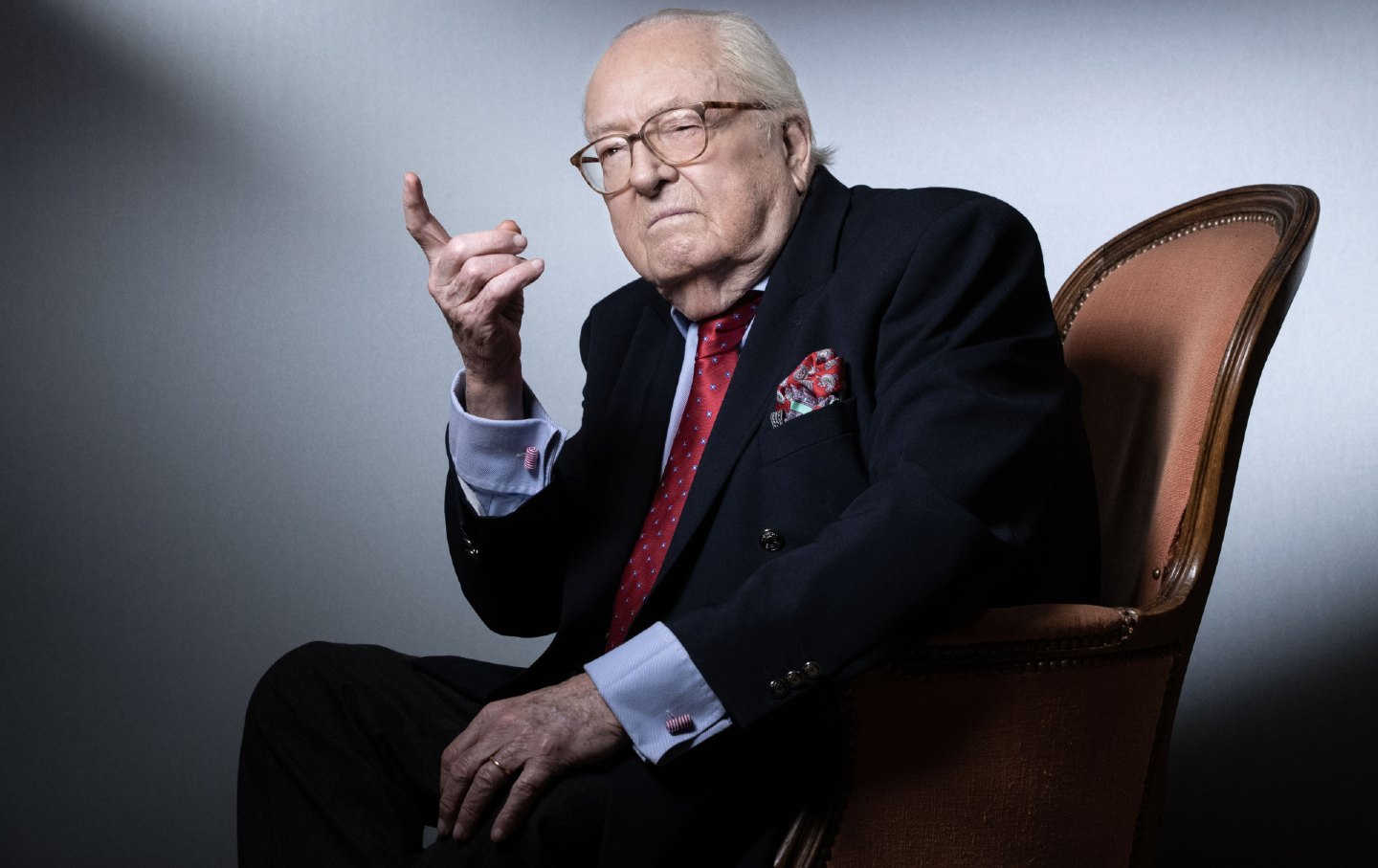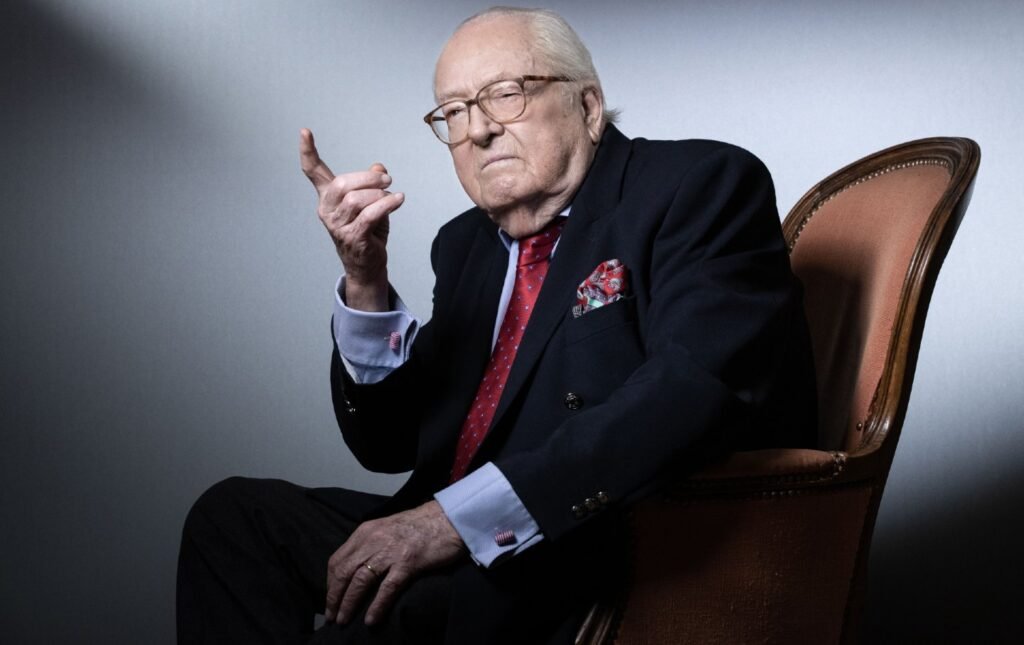The elder Le Pen is dead, but far-right populists around the world continue to echo his mix of violent rhetoric, brazen lies and appeals to mainstream conservatives.

Jean-Marie Le Pen, founder of the far-right National Front party, points his finger during a photo session at his home in Saint-Cloud on January 14, 2021.
(Joel Saget/AFP via Getty Images)
Donald Trump probably doesn’t know it, but he owes a lot to Jean-Marie Le Pen, the leader of the French far-right, who died Tuesday at the age of 96. – a novice and fan of gossip columns, Le Pen created a model of far-right national populism that has since swept much of the globe. He has done more than any other single figure to pioneer a cunning mix of violent rhetoric (mostly anti-immigrant), brazen lies, condemnation of neo-fascists and cautious engagement with mainstream conservatives. Steve Bannon has been a fan of Le Pen, while direct imitators in Europe include Jörg Haider of Austria, Geert Wilders of the Netherlands, Nigel Farage of Britain, Viktor Orbán of Hungary and, last but not least, Le Pen’s daughter Marine, who has a good chances of winning the next presidential election in France.
Le Pen’s political history has been long, ugly, vicious and depressingly successful. Born into a Breton fishing family, he embraced extremes from an early age. As a law student in the early 1950s, he became involved in far-right circles associated with French fascists and wartime Nazi collaborators, and became known for his love of street fighting against communists. He was a physically imposing man, six feet tall and over 220 pounds, with a loud voice and a gruff, aggressive manner. Constantly gesticulating with his fists, he easily drew attention to himself.
At the age of just 28, he won election to the parliament of the French Fourth Republic as a member of the short-lived populist party UDCA, led by Pierre Poujad. (Le Pen was, in fact, the last surviving deputy of the Fourth Republic, which fell in 1958.) His frequent attacks on the Jewish Prime Minister, Pierre Mendez-France, were laced with unabashed anti-Semitism: “I tell him: you are not exposed the country for sale as carpets at reduced prices.’ His military experience, first in Indochina and then in Algeria, left him loyal to the French colonial empire and a deep hatred of the politicians who surrendered it, most notably Charles de Gaulle. Le Pen openly bragged about torturing Algerian militants during his last tour in North Africa with the Parachute Regiment in 1957, and that he had links to the Secret Army Organization (OAS), which tried to assassinate de Gaulle.
Throughout the 1970s, Le Pen remained a creature of the political fringes. The far right was a powerful force in France during the late 19th and early 20th centuries. But the German occupation of 1940–1944, during which the far-right Vichy government collaborated with Hitler (and sent 77,000 Jews to die in the Holocaust), left him largely discredited. As a result, few mainstream politicians saw Le Pen as a threat when he founded the Front National in 1972. Most of its early members came from the neo-fascist New Order movement, and a key figure, Victor Barthelemy, served as a lieutenant to Jacques Dario, the wartime leader of the fascist and collaborationist French People’s Party. The Front received only 1.3% of the vote in the 1973 parliamentary election and 0.7% for Le Pen alone in the 1974 presidential election.
But the memory of the war years has faded, and the slow disintegration of the once-powerful Communist Party has become a surprising source of support for the Front in high-unemployment industrial areas where an aging and resentful population has proven all too receptive to anti-immigrant messages. Le Pen worked steadily, received generous donations from wealthy reactionaries, and won a number of infighting. And in 1983 he made his first breakthrough, when the Front won 16 percent of the vote in the industrial city of Dreu and joined mainstream conservatives in a coalition government. Machiavellian socialist president Francois Mitterrand helped him by cynically proposing to give new immigrants the right to vote in local elections, knowing that this would weaken the mainstream right by drawing part of their electorate to the Front.
In 1986, the party won an unprecedented 35 seats in the National Assembly, and two years later Le Pen himself won 14.4 percent in the first round of the presidential election against Mitterrand. However, Le Pen remained toxic—still associated with former fascists and Nazi collaborators and prone to racist and anti-Semitic outbursts that earned him convictions for hate speech. In a 1987 interview, he famously called the gas chambers of the Holocaust “a point of historical detail.”
Despite this, the party continued to grow. Now Le Pen presented himself as an opponent of European integration, claiming that the irresponsible French elites are surrendering the country’s sovereignty to Brussels. The announcement shocked working-class French people, especially after a spike in inflation blamed on France’s introduction of the euro. And in 2002, Le Pen caused a political earthquake by entering the second round against the incumbent Jacques Chirac, receiving almost 4.8 million votes. Although Chirac rallied almost all political factions behind him and eventually defeated Le Pen (who only slightly increased her score), the result was indisputable: the National Front was now the main political party. In 2005, the electorate shocked French elites once again when it rejected a proposed European constitutional treaty in a referendum, demonstrating the power of Le Pen’s nationalist message.
The first decade of this century was marked by the rise of Le Pen’s daughter Marine, who succeeded her father as party leader in 2011. The relationship between them, to put it mildly, was not easy. Marin, who bears a striking resemblance to Jean-Marie, consistently pushed for the Front to “demonize” itself. She wanted the party to break ties with fascists and outspoken anti-Semites, cultivate support for French Jews, and emphasize its loyalty to the French Republic and the legacy of the French Revolution. During the 2007 presidential campaign, she persuaded her father to announce her candidacy on the anniversary of Valmi’s great revolutionary military victory on the battlefield. She tried to dress the Front’s anti-Muslim racism in the language of “laïcité” — French republican secularism.
In the decade’s fierce debate over whether to ban “flashy religious symbols” in schools (such as the hijab), the Front effectively joined forces with many left-leaning “seculars”. But Jean-Marie refused to break his old habits, saluting an anti-Semitic comedian and continuing to socialize with neo-fascists. In 2015, after he defended his old comment about the gas chambers, Marin led a move to expel him from the party, and they did not speak for several years (although they reconciled before his death). In 2018, she renamed the party National Unity. But she remains Le Pen: fiercely hostile to immigrants, contemptuous of French elites and the European Union, and viscerally authoritarian in manner and rhetoric.
More about Jean-Marie Le Pen:
Like an angry Moses, Jean-Marie Le Pen died without ever setting foot on the promised land – in the Elysée Palace, the residence of the French presidents. But his movement may well get there. Since 2015, there has been a catastrophic drop in support for both the main republican (neoholistic) and socialist parties. Centrist Emmanuel Macron managed to create unstable coalitions and twice defeated Marine Le Pen in the presidential elections. But in the parliamentary elections of 2022, the National Union won 89 deputies — the largest number of far-right parties since the 1880s. Over the next two years, Macron’s arrogant insistence on promoting neoliberal reforms, despite the objections of both public opinion and parliament (in France, the president and prime minister can legislate by decree), led to a collapse in his popularity.
In last June’s EU elections, the National Union won a landslide victory, winning more than twice as many votes as its nearest rival and sending France into political chaos from which it has yet to emerge. In a desperate move, Macron called for snap parliamentary elections, leading to a disastrously fractured National Assembly. The hastily created left-wing New People’s Front managed to beat the National Rally, but did not win a majority. The new government, led by conservative Michel Barnier, stumbled for three months with the tacit support of Raleigh, but in December Marine Le Pen abandoned that support and joined the left in a vote of no confidence. Macron then chose centrist veteran Francois Bairro to replace Barnier, but he also serves Marine Le Pen effectively. It is possible that if Bayrou’s government in turn collapses, Macron may have no choice but to resign, forcing a new presidential election. Whether Marin herself will be able to compete is questionable: as a result of a corruption scandal, the court may soon ban her from running for office for five years. But her charismatic young protégé, Jordan Bardella, is ready to replace her.
So, in a year when Donald Trump is returning to power and his ideological allies around the world are making terrible gains, Jean-Marie Le Pen’s horrible daughter or her protégé may finally realize his most cherished ambition: to seize power as the president of France.


